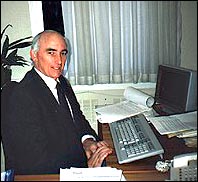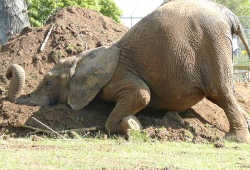– Dorothy – 15/5/97
“I’ve been made redundant” – a phrase heard all too often in New Zealand in the last decade. Read the story of how coping with this change affected Bede Martin and his family, and how they have responded to the changes.
After redundancy “I’ve been made redundant” – “Redundant” – dictionary definition, “superfluous, liable to dismissal as no longer needed for any available job”. Dispensing with redundant staff may sound like sensible business practice, like cutting away dead wood. To the person who has lost the job and that person’s family, however, the impact is traumatic.
Joining the Social Welfare Department Bede Martin wanted a profession in which he could help other people, so he completed a degree in Social
 |
| Bede Martin |
Work at the University of Canterbury. His
first job was as a social worker in the Department of Social Welfare in Christchurch. He wanted to work with communities, not just with individuals, so he applied for a position in Rangiora, a small country town north of Christchurch. There he was able to make a wider impact by working with community groups.
Because his work in Rangiora was so successful, he was sent to the West Coast of the South Island, an isolated, low-population area with a resource-based economy dependent on coal, forestry, fishing and gold. This has had a ‘boom and bust’ history, with many people’s livelihoods as casualties, and has been generally a socially deprived community.
Bede achieved ready acceptance among the people on the Coast. The people there appreciated his method of working, and he moved quickly from being an ‘outsider’, the usual role of newcomers to the Coast, to being thought of as a ‘Coaster’. Being already married to a true Coaster helped too. In 1986 he was appointed as Head of Social Welfare on the Coast – work he enjoyed in the part of New Zealand that he and his family so loved.
Development of Social Welfare in New Zealand As we talked, Bede looked back over the development of social welfare in New Zealand. In the early years of the colony society believed that individuals were responsible for their own welfare, but parishes and voluntary groups looked after the disadvantaged. The first significant State intervention came in 1918, with some support of the health system. After the election of the Labour Government at the end of the Depression in the thirties, full Social Security was introduced to cover pensions for the aged, invalids and widows. In the period of full employment little funding was needed to support the unemployed.
The introduction of the Domestic Purposes Benefit for solo parents caring for a young family and then Universal Superannuation paid out regardless of existing income became manipulated by politicians which led to an unsustainable system and placed what right wing politicians have described as”an intolerable burden on the state”.
The introduction of right wing policies from 1984 onward meant an attack on the welfare state and changes in Government policy which greatly increased the sums paid out for the unemployment benefit.
Government restructuring hits the West Coast Major Government Departments were restructured, in particular State Coal, Forestry and Railways – all big employers for Coast people. Bede set up support systems for those who lost their jobs, knowing as he worked that change might lie ahead for him too.
Redundancy In 1991, with restructuring of the Social Welfare Department, Bede’s position was ‘disestablished’ as the Government decided that the management of the West Coast offices should be done by the Nelson branch.
That change meant that the career built up over twenty years in the Department of Social Welfare had come to an end. Rather than seek another less senior position elsewhere within the department, Bede and his wife, Maryanne, and the family decided that they would try above all to remain on the Coast, which meant so much to them. Bede found two part-time jobs – at the Tai Poutini Polytechnic and at the Business Development Centre – and he tried a brief publishing venture. However, even with all this work, life was still insecure, and in 1996 the family decided to move over the mountains to Christchurch.
A new start That phrase, a new start, sounds full of promise, but for a family leaving their roots it can be very threatening. Houses in Christchurch cost a great deal more than houses on the Coast, and to move to a city without a firm prospect of a job is a leap of faith. Happily, Bede found contract work for six months assisting the unemployed and then a permanent position as manager of the Christchurch Community Law Centre.
What has been the impact of that change? Bede looked at several aspects of the change which he listed as physical, emotional and intellectual, financial, family and spiritual.
Physical impact While trauma ages people physically Bede feels that he now has more control physically over life. Where before he accepted everything that happened and fulfilled the obligations of his role, now he feels that he is not trapped and has new vitality.
Emotional and intellectual aspects With the change in lifestyle he now sees himself as having a wider range for thought, an increased ability to see life as a whole, and a new freedom to express his ideas without considering his position as a senior officer in a government department. For the whole family, however, there was a loss of status and a sense of the humiliation that goes with redundancy.
Financial costs From security the family moved to insecurity and a considerable drop in income. They found that they were looking at what mattered and weighing up priorities, and any treats they allowed themselves were relished with heightened enjoyment.
The Family’s reactions At first Bede and Maryanne’s daughter and sons felt unsettled. From a situation where their father’s job gave them security and some status in the community they were now plunged into anxiety about their future. The move to Christchurch meant a change of schools and at first they desperately missed their friends on the Coast. After a year they have settled and now see some benefits in being in the city and in bigger schools.
The move to Christchurch meant separation from grandparents and other family, so the support of the extended family was lost.
The stresses and strains of all that has happened have made Bede and Maryanne’s marriage even more a united partnership and they have found new strengths.
Spiritual Growth They had been through the major life changes of marriage, becoming parents, and changing jobs – one at a time – but their emotional strength had never before been so tested. The traumatic changes in so many aspects of their lives following redundancy have led them to self-exploration and spiritual growth from their anguish. Their faith has become more integrated into their daily life.
Bede’s present job Bede finds great satisfaction in his new job as manager of the Christchurch Community Law Office, as he believes in the importance of the Centre’s work dealing with issues of injustice to individuals. The aim of the Centre is ‘to identify and attempt to meet unmet legal needs, offering an advice and information service and educating people so that they are empowered by having enough information to make informed decisions’. There is also work in the area of law reform. This type of work has many of the facets that drew Bede into social work twenty five years ago.
In retrospect Looking back over what has happened Bede sees the whole experience as full of paradoxes. Losses have been balanced by gains in other areas, and the family would not now want to go back to the old life. They are relishing the challenge of the present.
People Making Changes Main Page




